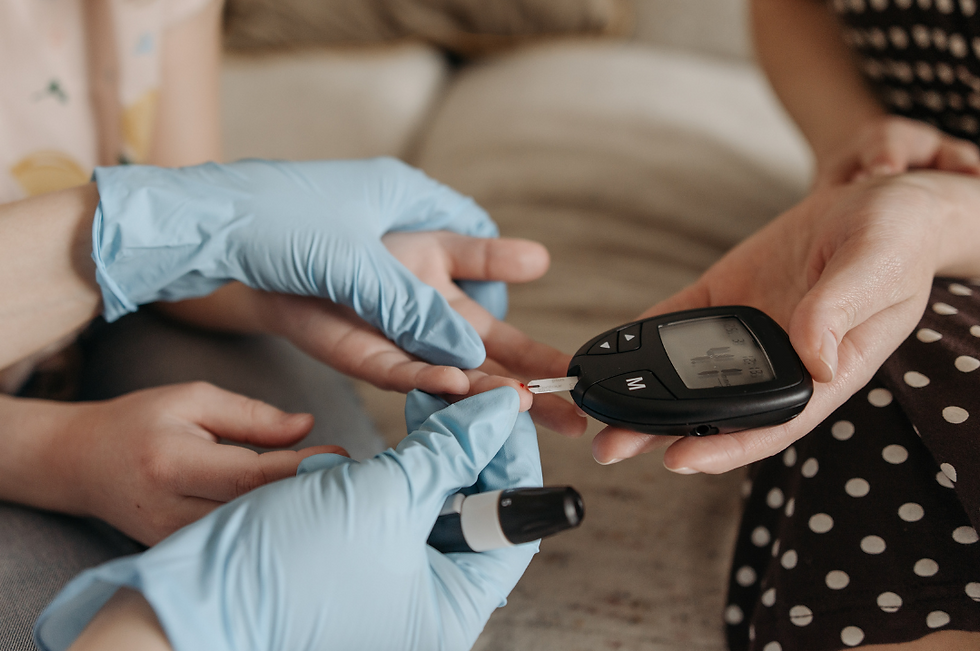PCOS Signs and Symptoms
- Catherine McKelvey

- Nov 3, 2025
- 4 min read

Key Highlights:
PCOS is common but often overlooked, affecting 6–18% of women of reproductive age, yet around 70% remain undiagnosed.
Women often wait about eight years for a diagnosis, which can lead to frustration, anxiety, and body-image concerns.
PCOS presents with wide-ranging symptoms including irregular periods, acne, excess or thinning hair, fertility challenges, fatigue, low libido, ovarian cysts, weight changes, and insulin resistance.
It carries serious health risks, with higher rates of type 2 diabetes, metabolic syndrome, gestational diabetes, cardiovascular disease, and endometrial cancer.
The emotional impact is significant, with PCOS linked to depression (36.6%), anxiety (41.9%), and body-image distress that can discourage healthy behaviours like exercise.
Polycystic Ovarian Syndrome, or PCOS, is one of the most common hormonal conditions in women, yet it often feels like one of the least understood. Despite how widespread it is, many women spend years searching for answers before anyone puts a name to what they are experiencing.
How common is PCOS?
The numbers vary depending on which criteria are used, but research suggests PCOS is the most common endocrinopathy in women, affecting between 6% and 18% of women of reproductive age. Studies also show about 1 in 8 Caucasian women are affected, with even higher rates among Aboriginal and South Asian women migrating to developed countries.
And yet, around 70% of women with PCOS remain undiagnosed.
PCOS Diagnosis
On average, women wait about eight years for a diagnosis. That’s a long time to live with uncertainty. Many describe feeling unheard or being told their symptoms are “normal” parts of womanhood. Others face fragmented care, with each symptom treated separately rather than as part of a bigger picture.
International research highlights common experiences women report along the way:
Being underdiagnosed or misdiagnosed.
Dissatisfaction with how the diagnosis was explained or handled.
Experiencing delayed answers despite ongoing symptoms.
A sense of loss of femininity or persistent body-image distress.
Anxiety about long-term health consequences.
Limited access to education, prevention, and symptom management.
Frustration at the lack of a clear “cure”.
By the time a diagnosis is finally made, many women carry not only the physical effects of PCOS but also the emotional weight of years of uncertainty.
What are the first signs of PCOS?
Part of the difficulty is that PCOS looks different from person to person. Some women notice changes to their cycle, others see differences in skin or hair growth, and some experience challenges with weight or fertility.

Common PCOS symptoms include:
Irregular or absent periods
Acne, excess facial or body hair, or thinning hair on the scalp
Weight gain or difficulty losing weight
Insulin resistance or changes in blood sugar regulation
Difficulty conceiving due to irregular ovulation
Ovarian cysts, often seen on ultrasound
Fatigue that feels persistent and hard to explain
Low sex drive, which may be linked to hormonal changes or mood
High testosterone levels, found on blood tests and sometimes reflected in symptoms like acne or excess hair
These symptoms may appear in different combinations, and their intensity can shift over time.
PCOS and Diabetes, other health concerns
PCOS is not just about fertility or periods. It can affect health across the lifespan.
Research shows women with PCOS face higher risks of:
Metabolic and physical health

Gestational diabetes during pregnancy.
Impaired glucose tolerance, metabolic syndrome, and type 2 diabetes — risks increase with age and are worsened by higher BMI. In fact, studies suggest the likelihood of type 2 diabetes is up to 5 times higher in Asia, 4 times higher in the Americas, and 3 times higher in Europe compared to women without PCOS.
Cardiovascular disease (CVD) — evidence points to an increased risk, though research is still evolving.
Endometrial cancer — with a relative risk 2–6 times higher, often presenting before menopause, though the overall risk remains low.
Mental health and wellbeing
Depression and anxiety, which occur at significantly higher rates in women with PCOS, independent of body weight.
Reduced quality of life, often linked to symptoms, body image, and uncertainty about long-term health.
Body image distress and psychosexual difficulties, which can affect relationships and confidence.
Eating disorders and disordered eating patterns, though not typically anorexia.
Reproductive health
Anovulatory infertility — affecting an estimated 70–80% of women with PCOS at some stage.
PCOS and Anxiety
Just as important as the physical effects are the emotional ones. Studies report a higher rate of moderate to severe depressive symptoms in women with PCOS, with a reported prevalence of 36.6%.
Moderate to severe anxiety symptoms are also more common, with a reported prevalence of 41.9%.
PCOS and Body Image Distress
Body image distress is also common. Body image is simply how someone perceives their physical self and the thoughts and feelings that follow.

About 70% of women with PCOS who are overweight or obese report unhappiness about their body size, and nearly half say these feelings stop them from taking part in physical activity.
This emotional load matters. Negative body image can fuel self-criticism, avoidance of exercise, and unhealthy dieting behaviours, which only makes symptoms harder to manage.
PCOS Awareness
PCOS is complex, but not hopeless. With the right support, women can take steps to manage symptoms, reduce long-term risks, and improve quality of life. The first step is understanding, which includes recognising the signs, knowing the risks, and feeling empowered to seek care that looks at the whole picture.
In our other blog, we explore one of the most powerful PCOS treatments to manage it: exercise. Exercise is more than fitness. It can help regulate hormones, improve insulin sensitivity, and lift mood.







Comments